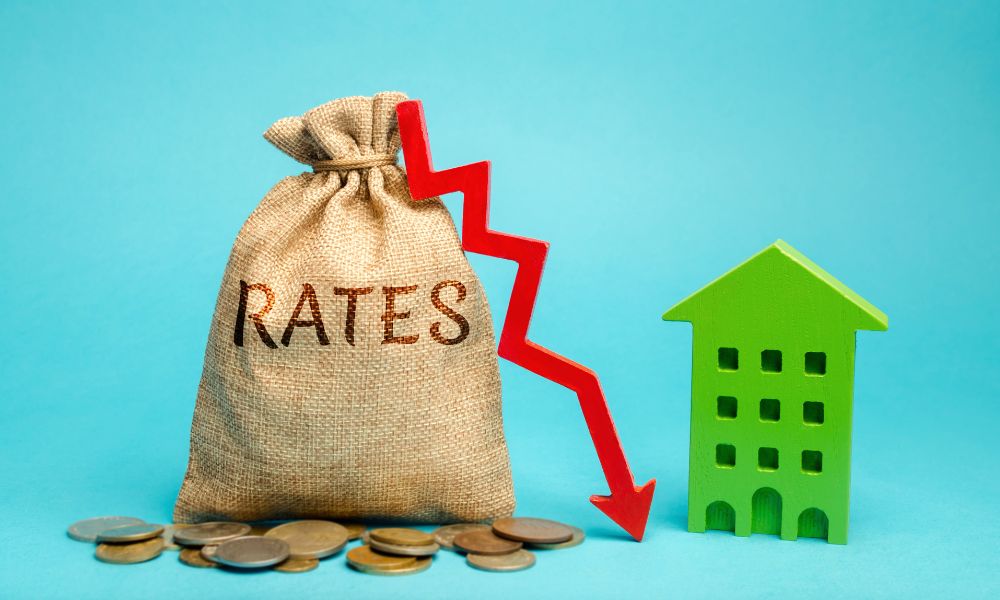When it comes to obtaining a large business loan, understanding interest rates is crucial for making informed financial decisions. Interest rates determine the cost of borrowing money and can have a significant impact on your business’s overall financial health. Here, we will unpack interest rates for large business loans, providing you with valuable insights.
Large business loans refer to substantial sums of money borrowed by established businesses to finance various operational needs, such as expansion, equipment purchase, or working capital. These loans typically have higher principal amounts and longer repayment periods compared to small business loans.
Several factors influence the interest rates on large business loans. First and foremost is the credit score of the borrower, as it reflects the borrower’s creditworthiness. the loan repayment period, business financials including revenue and profitability, and the presence of collateral play significant roles in determining the interest rate.

There are different types of interest rates that lenders may offer for large business loans. Fixed interest rates provide stability and predictability with fixed monthly payments throughout the loan term. Variable interest rates fluctuate based on market conditions, meaning your monthly payments can vary. Prime-based interest rates are tied to the prime rate, which is the interest rate that banks offer to their most creditworthy customers.
To secure the best interest rates on large business loans, it is essential to shop around and compare offers from different lenders. Banks, credit unions, online lenders, and peer-to-peer lending platforms are potential sources for obtaining a large business loan, each with their own interest rate offerings.
By understanding the complexities of interest rates for large business loans and carefully considering various factors, you can make informed decisions that align with your business’s financial goals and objectives.
Key takeaway:
- Understanding interest rates for large business loans is crucial: Large business loans are substantial amounts borrowed by businesses for various purposes. Knowing how interest rates are determined can help businesses make informed financial decisions.
- Factors that impact interest rates on large business loans include credit score, loan repayment period, business financials, and collateral: Lenders consider these factors to assess the risk associated with lending to a business, which affects the interest rate offered.
- Types of interest rates for large business loans include fixed rates, variable rates, and prime-based rates: Each type carries its own advantages and disadvantages, and businesses should carefully consider which type suits their financial goals and risk tolerance.
- To get the best interest rates on large business loans, businesses should maintain a good credit score, provide strong financial statements, choose an appropriate repayment period, and offer collateral: These factors can increase the likelihood of securing lower interest rates.
- Comparing interest rates offered by different lenders is vital: Banks, credit unions, online lenders, and peer-to-peer lending platforms may offer varying interest rates. Businesses should shop around to find the best rates and terms for their specific needs.
Understanding Interest Rates for Large Business Loans
Understanding interest rates for large business loans is crucial for entrepreneurs seeking funding. It is essential to actively consider these rates when evaluating borrowing options. Interest rates for business loans are factual figures that determine the cost of borrowed funds. Unlike personal loans, business loans typically have lower interest rates due to their larger amounts. Multiple lenders offer varying rates, so it is vital to compare multiple options. To comprehend these rates, entrepreneurs must analyze the annual percentage rate (APR). This percentage portrays the total cost of borrowing funds, including both interest and additional fees. Lenders determine the APR based on factors such as creditworthiness, loan duration, and market conditions. Understanding interest rates for large business loans enables entrepreneurs to make informed decisions. It allows for effective evaluation and comparison of loan offerings. By analyzing the APR and considering multiple lenders, entrepreneurs can secure the most favorable rates for their business ventures, saving substantial amounts of money in the long run.
What Are Large Business Loans?
Large business loans, also known as large corporate loans or commercial loans, are financial resources specifically tailored for sizable businesses to support their operational expenses, expansions, or any other financial requirements. These loans involve substantial amounts of money and necessitate the fulfillment of specific criteria by businesses.
While exploring large business loans, several crucial aspects should be taken into consideration:
1. Loan Type: Diverse options for large business loans exist, including term loans, lines of credit, and commercial real estate loans. Each loan variant carries its own set of terms and conditions.
2. Credit Score: The credit score of the business and its owners plays a pivotal role in determining the loan’s interest rates and the eligibility of the business. A higher credit score generally translates to more favorable loan terms.
3. Repayment Period: The duration over which the loan repayment occurs varies, impacting the total interest paid. Businesses must evaluate their revenue projections and cash flow to ascertain the repayment period that aligns best with their financial situation.
4. Business Financials: Lenders scrutinize the business’s financial statements, profit margins, and cash flow to evaluate its ability to repay the loan. Strong financial standing can lead to better interest rates and loan conditions.
5. Collateral: Certain lenders might require collateral as a means to secure the loan. Offering collateral can potentially lower interest rates and enhance loan terms.
By thoughtfully evaluating these factors, businesses can make informed decisions while applying for large business loans, thereby ensuring they select an option that ideally matches their needs and financial capacities.

Factors That Impact Interest Rates on Large Business Loans
Factors That Impact Interest Rates on Large Business Loans
When it comes to large business loans, several factors have an impact on the interest rates. These factors include the credit score, loan repayment period, business financials, and collateral.
The credit score assumes a significant role in determining the interest rate for a large business loan. Lenders view a higher credit score as an indication of lower risk, resulting in more favorable interest rates being offered.
In addition, the loan repayment period also influences the interest rates. Longer repayment periods may come with higher interest rates because the lender is exposed to risk for an extended duration of time.
Furthermore, business financials, including revenue, profitability, and cash flow, are pivotal factors. Lenders analyze the financial health of the business to assess its ability to repay the loan. Positive financials can lead to lower interest rates.
Collateral also plays a crucial role. Providing valuable assets as collateral can increase the chances of securing a lower interest rate, as it provides the lender with a sense of security in case of default.
When seeking a large business loan, it is essential to thoroughly evaluate these factors. By maintaining a good credit score, demonstrating strong financial performance, and offering suitable collateral, businesses can negotiate favorable interest rates that align with their financial goals.

Credit Score
The credit score is a crucial factor that significantly impacts the interest rates on large business loans. Lenders rely on the credit score to evaluate the creditworthiness and risk of a borrower. A higher credit score indicates a lower risk profile, which in turn can lead to more favorable interest rates.
For borrowers to qualify for a business loan, lenders typically require a minimum credit score. The specific credit score requirement may vary depending on the lender and the type of loan. Maintaining a high credit score is essential for businesses as it increases their chances of obtaining loans with favorable interest rates.
A good credit score not only helps in securing a loan but also influences the interest rate provided by the lender. A higher credit score can result in lower interest rates, ultimately saving businesses money in the long term. Conversely, a lower credit score may result in higher interest rates, increasing the overall borrowing cost.
Businesses seeking to secure large business loans at competitive interest rates must prioritize maintaining a strong credit score. It is advisable to regularly monitor and manage the credit score by paying bills on time, reducing existing debt, and keeping credit utilization low.
Loan Repayment Period
When considering large business loans, the loan repayment period is an important factor to take into account. The length of time you have to repay the loan can impact the total cost of borrowing and your monthly payments. Here is a table outlining different loan repayment periods:
| Repayment Period | Description |
| Short-term | Usually less than 2 years |
| Medium-term | 2 to 5 years |
| Long-term | More than 5 years |
The loan repayment period affects the amount of interest you will pay over the life of the loan. A shorter repayment period typically results in higher monthly payments but less interest paid overall. On the other hand, a longer repayment period may have lower monthly payments but potentially higher interest costs.
For more information on interest rates for large business loans, you can check out Unpacking Interest Rates for Large Business Loans.
It’s important to consider your business’s financial situation and projected cash flow when choosing a loan repayment period. Ensure that the monthly payments will be manageable and not strain your business’s finances.

Additionally, the loan repayment period can vary depending on the type of loan you choose and the lender’s terms. Some lenders may offer more flexibility in choosing a repayment period, while others may have stricter requirements.
Ultimately, finding the right loan repayment period for your business is about balancing your financial capacity with your borrowing needs.
Business Financials
| Business Financials |
| When applying for a large business loan, your business financials play a crucial role in determining the interest rate you will receive. Lenders will analyze your company’s financial statements, including the balance sheet, income statement, and cash flow statement, to assess its financial stability and ability to repay the loan. Key metrics such as revenue, profitability, and debt-to-equity ratio will be closely examined. |
| Additionally, lenders will consider your company’s credit history, including your business credit score. A higher credit score indicates lower credit risk, which can lead to more favorable interest rates. It is important to maintain a strong credit profile by making timely payments and managing your business’s finances responsibly. |
| If your business has a consistent and positive financial track record, lenders are more likely to offer you lower interest rates. Demonstrating a solid financial position and growth potential can instill confidence in lenders that you will be able to repay the loan on time. |
| It is also crucial to provide a clear and detailed business plan that outlines how the loan will be used and how it will benefit your company’s financial performance. Lenders want to see a well-thought-out plan that demonstrates your ability to generate sufficient cash flow to cover loan repayments. |
Collateral
| Collateral |
| Collateral is an important factor when applying for a large business loan. It refers to the assets that a borrower pledges to the lender as security for the loan. |
| The type of collateral offered can vary depending on the loan and the lender’s requirements. Common types of collateral include properties, equipment, inventory, and accounts receivable. |
| Having collateral can positively impact the interest rates on large business loans. Lenders perceive collateral as a form of security, reducing their risk in case of default. This often leads to lower interest rates. |
| The value of the collateral is also essential. Lenders typically consider the market value of the assets being pledged. A higher value of collateral can result in more favorable interest rates. |
| It is important to note that when pledging collateral, the borrower risks losing the assets if they fail to repay the loan. Therefore, it is crucial to carefully assess the ability to repay the loan before using valuable assets as collateral. |
Types of Interest Rates for Large Business Loans

When it comes to large business loans, understanding the different types of interest rates is crucial. Get ready to dive into the world of interest rates with me. We’ll explore the benefits and nuances of fixed interest rates, variable interest rates, and prime-based interest rates. Strap in, because by the end of this section, you’ll have a clear understanding of how these rates can impact your business’s financial landscape. No more confusion, just straight-up knowledge! Let’s get started.
Fixed Interest Rates
Fixed interest rates on large business loans offer stability and predictability. Here are some key aspects of fixed interest rates:
- Certainty: Fixed interest rates remain constant throughout the loan term, providing borrowers with a clear understanding of their monthly payments.
- Protection against rate fluctuations: With fixed interest rates, borrowers are shielded from market changes and potential increases in interest rates.
- Planning and budgeting: Businesses can accurately plan and budget for loan repayments, as fixed interest rates allow for consistent payments over time.
- Long-term loans: Fixed interest rates are often available for longer-term loans, providing businesses with financial stability and the ability to spread out the cost of borrowing.
- No unexpected surprises: Unlike variable interest rates, fixed rates don’t change unexpectedly, which can help businesses avoid sudden increases in their monthly loan payments.
By selecting a loan with fixed interest rates, businesses can have peace of mind knowing that their interest rate and monthly payments will remain consistent throughout the loan term. This allows for better financial planning and stability in managing the costs associated with the loan.
Variable Interest Rates
The concept of variable interest rates is an integral part of large business loans. Here are some key aspects to consider:
- Flexibility: Variable interest rates, like the ones called Variable Interest Rates, can fluctuate over time based on changes in the market. This can provide businesses with the opportunity to take advantage of lower interest rates when they occur.
- Risk factors: Variable interest rates, such as Variable Interest Rates, are influenced by various factors such as economic conditions, inflation, and central bank policies. It is essential for businesses to assess these factors and be prepared for potential increases in interest rates.
- Potential savings: In certain market conditions, variable interest rates, like the ones referred to as Variable Interest Rates, may be lower than fixed rates, enabling businesses to save money on interest payments.
- Concerns over stability: The unpredictable nature of variable interest rates, such as Variable Interest Rates, can make budgeting and financial planning more challenging for businesses. If interest rates increase significantly, it could lead to higher borrowing costs.
- Monitoring and adjustments: Businesses with loans tied to variable interest rates, like Variable Interest Rates, should regularly monitor market trends and consider refinancing options if rates become unfavorable.
Fact: According to historical data, variable interest rates, such as Variable Interest Rates, have shown both positive and negative trends, demonstrating the importance of carefully evaluating market conditions and considering the potential impact on a business’s financial stability.

Prime-based Interest Rates
When it comes to large business loans, prime-based interest rates are an important factor to consider. Prime-based interest rates, also known as prime rate + margin, are determined by adding a margin to the prime rate, which is the interest rate that commercial banks charge their most creditworthy customers.[8] Typically, prime-based interest rates are lower than fixed interest rates, but they can fluctuate over time.[8] This means that your monthly payments may vary depending on changes to the prime rate.
| Loan Type | Interest Rate |
| Prime-based Interest Rate | Prime Rate + Margin |
| Fixed Interest Rate | Fixed Rate |
| Variable Interest Rate | Variable Rate |
When considering prime-based interest rates, it’s important to monitor fluctuations in the prime rate and assess how they may impact your monthly payments. If you’re confident that the prime rate will remain stable or decrease, opting for a prime-based interest rate may be a favorable choice as it could potentially result in lower overall interest costs. However, if you prefer more predictable and steady monthly payments, a fixed interest rate may be more suitable for your business.
Before making a decision, compare the prime-based interest rates offered by different lenders, such as banks, credit unions, online lenders, and peer-to-peer lending platforms. Consider the repayment period, your credit score, and the collateral required for the loan. By doing your due diligence and understanding how prime-based interest rates work, you can make an informed decision that aligns with the financial needs of your business.
How to Get the Best Interest Rates on Large Business Loans?
Are you wondering how to get the best interest rates on large business loans? It’s essential to secure favorable rates to minimize costs and maximize profitability. Here are some steps you can follow:
- Research the market: Take the time to explore different lenders and compare their interest rates for large business loans. Look for reputable lenders that offer competitive rates.
- Maintain a strong credit score: Demonstrating your creditworthiness to lenders is vital. Ensure you pay your bills on time, keep your credit utilization low, and resolve any outstanding issues.
- Build a solid business plan: Lenders want to see that your business is financially stable and has a strategic vision. Develop a comprehensive business plan that showcases your financial projections and growth potential.
- Consider loan terms: Longer loan terms usually come with lower interest rates. However, keep in mind that extending the loan term may result in paying more interest over time.
- Seek professional advice: If you’re unfamiliar with the loan application process, consulting with a financial advisor or loan specialist can help you navigate the complexities and make informed decisions.
By following these steps, you can increase your chances of obtaining the best interest rates on large business loans, saving your business money in the long run.

Comparison of Interest Rates by Different Lenders
When it comes to obtaining large business loans, understanding the nuances of interest rates is crucial. In this section, we’ll dive into a comparison of interest rates offered by different lenders. From traditional banks to credit unions, online lenders, and even peer-to-peer lending platforms, we’ll explore the various options and shed light on the potential savings and costs associated with each. So, strap in as we navigate through the intricate landscape of interest rates in the world of business loans.
Banks
Banks play a crucial role in determining the interest rates for large business loans. They consider several factors when determining the interest rate for a loan, such as the business’s credit score, loan repayment period, business financials, and collateral provided. Banks use these factors to assess the risk associated with lending to a particular business.
Having a strong credit score increases the chances of getting a lower interest rate from banks. The loan repayment period also affects the interest rate, with longer repayment periods typically resulting in higher interest rates due to the increased risk. A business’s financial health, including factors like profitability and cash flow, impacts the interest rate offered by banks. Additionally, the presence of collateral can provide security to the bank, leading to a lower interest rate.
Comparing interest rates offered by different banks is essential to find the best deal for large business loans. It is advisable to research and approach various banks to understand their terms and conditions. By obtaining multiple offers, businesses can negotiate for better interest rates.
Credit Unions
Credit unions, as financial institutions, provide a variety of services, including large business loans. Being member-owned and non-profit organizations, credit unions can offer their members competitive interest rates. When considering a loan from a credit union, it is vital to evaluate their eligibility criteria and loan terms.
One advantage of obtaining a large business loan from a credit union is that they take into account factors beyond just the credit score. Credit unions assess the overall financial health of the business, considering revenue, cash flow, and profitability. This is especially beneficial for businesses with an imperfect credit history but stable financial performance.
Moreover, credit unions provide personalized service and a more flexible approach to lending. They understand the local business landscape and are more inclined to support businesses within their community. Consequently, credit unions can offer more favorable loan terms, including longer repayment periods or lower collateral requirements.
A true story that illustrates the benefits of credit unions is the case of a small local restaurant seeking expansion. Despite having a lower credit score due to past financial challenges, the restaurant approached a credit union for a loan. The credit union took the time to understand the unique situation of the restaurant and recognized its growth potential. They offered a competitive interest rate and worked closely with the restaurant to structure a loan that catered to their needs. This partnership enabled the restaurant to expand its operations successfully and thrive in the community.
Online Lenders
When considering large business loans, online lenders can be a viable option for borrowers. Here are some key points to consider:
- Convenience: Online lenders offer the convenience of applying for a loan from the comfort of your own space. The entire process can be completed online without the need for in-person meetings or visits to a physical branch.
- Quick approval: Online lenders often have faster approval processes compared to traditional banks. They use technology and algorithms to evaluate loan applications, making the decision-making process more efficient.
- Competitive interest rates: Online lenders may offer competitive interest rates, especially for borrowers with strong credit scores and a solid business track record. It’s important to compare rates from multiple lenders to ensure you’re getting the best deal.
- Flexible loan terms: Online lenders may offer more flexible loan terms compared to traditional banks. This can include options such as longer repayment periods or adjustable repayment schedules.
- Access to capital: Online lenders may have less stringent eligibility requirements compared to banks, making it easier for businesses to access the capital they need.
Pro-tip: Before choosing an online lender, carefully review the terms and conditions of the loan. Pay attention to factors such as interest rates, repayment schedule, and any fees or penalties. It’s also a good idea to read reviews and check the lender’s reputation to ensure they are reputable and trustworthy.

Peer-to-Peer Lending Platforms
When considering large business loans, one option to explore is peer-to-peer lending platforms like Peer-to-Peer Lending Platforms. These platforms connect borrowers directly with individual lenders, cutting out traditional financial institutions.
- Quick approval process: Peer-to-peer lending platforms typically have a streamlined application process, allowing borrowers to get approved for a loan quickly.
- Competitive interest rates: These platforms often offer competitive interest rates for borrowers, as they eliminate the overhead costs associated with traditional banks.
- Diverse funding sources: By utilizing peer-to-peer lending platforms like Peer-to-Peer Lending Platforms, borrowers have access to a diverse pool of lenders, increasing their chances of securing funding.
- Flexible loan terms: Borrowers can choose from a variety of loan terms that best suit their business needs, allowing for greater flexibility in repayment.
- Online accessibility: Peer-to-peer lending platforms like Peer-to-Peer Lending Platforms are easily accessible online, making it convenient for businesses to explore different loan options and compare interest rates.
Pro-tip: Before choosing a peer-to-peer lending platform like Peer-to-Peer Lending Platforms, carefully review the terms and conditions, interest rates, and fees associated with the loans. It’s also important to consider the reputation and credibility of the platform to ensure a smooth borrowing experience.
Some Facts About Unpacking Interest Rates for Large Business Loans:
- ✅ Average interest rates for large business loans can range from 6% to 60%. (Source: LendingTree)
- ✅ Traditional banks tend to offer lower interest rates for large business loans, typically between 5.50% and 10.50%. (Source: Bankrate)
- ✅ Online lenders may have slightly higher interest rates for large business loans, ranging from 6% to 30%. (Source: Bankrate)
- ✅ The interest rate for large business loans can be influenced by factors such as the business’s revenue, credit history, and industry. (Source: Bankrate)
- ✅ To secure a favorable interest rate for a large business loan, businesses should demonstrate low risk through high revenue, strong cash flow, and a good credit history. (Source: Bankrate)
Frequently Asked Questions
What are the average business loan interest rates as of July 2023?
The average business loan interest rates as of July 2023 vary depending on the type of loan. Term loans have rates ranging from 6.00% to 45.00%, lines of credit have rates of 8.00% to 60.00%, SBA loans have rates of 10.50% to 16.25%, and merchant cash advances have a factor rate of 1.09 to 1.50. Bad credit business loans have rates of 25.00% to 75.00%+.
Do interest rates for business loans vary based on the type of lender?
Yes, interest rates for business loans can differ based on the type of lender. Banks typically offer lower interest rates, ranging from 5.50% to 10.50%. On the other hand, online lenders have rates of 6.00% to 30.00%. It is important to consider the lender’s rates and overall business relationship when choosing a loan.
What factors can affect the interest rate of a business loan?
Several factors can impact the interest rate of a business loan. These include the federal funds rate, the characteristics of the business (e.g., age, revenue, industry, credit score), personal financial details, and whether the loan is secured or unsecured. To secure the best interest rate, businesses should aim to appear low-risk to lenders by having high revenue, strong cash flow, and a good credit history.
How can businesses find the best business loan interest rate?
Businesses can improve their chances of finding the best business loan interest rate by improving their credit scores, shopping around for multiple lenders, comparing quotes, and negotiating with lenders. Aiming to appear low-risk by having high revenue, strong cash flow, and a good credit history can also help secure a favorable rate. Choosing a secured loan over an unsecured loan can lower interest rates as well.
What are the differences between fixed rate loans and variable rate loans?
Fixed rate loans have an interest rate that remains the same throughout the loan’s life, providing stability and better budget planning for long-term loans like commercial real estate or equipment loans. On the other hand, variable rate loans have interest rates that can change based on market conditions. They can be beneficial for short-term loans or business lines of credit, allowing borrowers to take advantage of rate drops without long-term commitment.
How long does it typically take to get approved for a large business loan from Bank of America?
Bank of America offers loans subject to credit approval, and the time to get approved can vary based on the individual circumstances and the loan amount. Once approved, funds are generally available within 10 business days. Customers can complete the loan application either in-person or over the phone, and the bank works with customers to determine the loan amount and terms that suit their budget.


